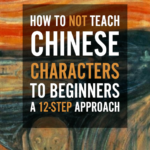Articles in the ‘Advanced’ category Page 16
-
Review: Learning Chinese by video immersion with FluentU
FluentU offers authentic as well as learner-oriented videos for learning Chinese. A neat interface allows you to use an excellent pop-up dictionary and other useful features to watch and learn from videos. This is an in-depth review of FluentU Chinese.
Read → -
7 mistakes I made when writing Chinese characters and what I learnt from them
Learning Chinese characters is an ongoing challenge that never really goes away. Even after studying Chinese for more than a decade, I make mistakes and forget characters. In this article, I analyse seven mistakes I’ve made recently and share what I learnt from these mistakes.
Read → -
7 ideas for smooth and effortless Chinese listening practice
Listening in Chinese can be hard, but solution is simple: listen more. That is not always easy to do, though, because it’s hard to both find the time to listen and to actually get started. Here are seven ideas for smooth and effortless Chinese listening practice.
Read → -
Should you learn the names of the strokes in Chinese characters?
Some teachers insist on teaching the names of the strokes that make up Chinese characters, but is learning them worthwhile or just a waste of time?
Read → -
How to not teach Chinese characters to beginners: A 12-step approach
This is a guide for how to not teach Chinese characters, based on more than a decade of observing terrible teaching and worst practices. Which of these have you seen?
Read → -
Review: The Outlier Dictionary of Chinese Characters
Outlier Linguistics Dictionary of Chinese characters is an excellent tool to help you understand and thereby learn Chinese characters more effectively. This is an in-depth review, covering the two versions of the dictionary, essential and expert, as well as other related products provided by outlier. There is also a 25% discount code for those who want to try the dictionary!
Read → -
Diversify how you study Chinese to learn more
How is it possible to spend 80 hours a week learning Chinese? And what can you learn from that, even if you find it hard to find any time to study whatsoever, with work and family taking up most of your time? This article aims at widening the scope of what it means to learn Chinese, and shows you ways you can learn that you probably haven’t thought of before!
Read → -
What important words are missing from TOCFL?
TOCFL is the standard test of Chinese proficiency in Taiwan. The official lists cover a total of 8000 words spread over 6 levels, but what words are common, yet missing or delayed in these lists? This article strives to answer this question. As a student, you probably want to check the missing and delayed words to plug holes in your Chinese vocabulary!
Read → -
What important words are missing from HSK?
HSK is not only a popular test, it’s also used by many students as a guide for which words to learn. But the HSK lists don’t contain all common words, so it raises the question which words are missing or delayed in the HSK word lists. This article gives one answer to this question, showing that certain categories of words are missing entirely, such as profanity, place names and names for things foreign in China. As a student, you probably want to learn these, so browsing through the list of missing words could be helpful!
Read → -
Improving your Chinese while watching TV shows
Watching TV is a great way to learn languages. It combines lots of useful Chinese words and phrases while providing rich context because of the visual nature of the medium. This article introduces ideas for how to learn, as well as recommended TV shows for beginner, intermediate and advanced learners.
Read →









